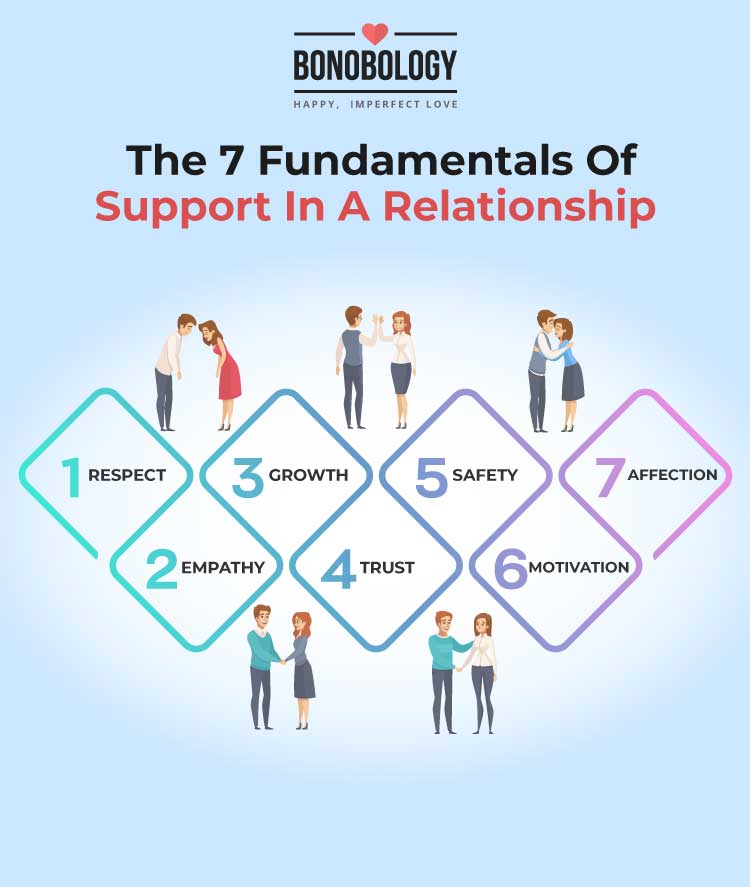A wise man once said that knowledge is power. So, to learn more about how supporting each other in a healthy relationship can nourish the bond between two people and how it paves the way for emotional intimacy, we reached out to psychologist Devaleena Ghosh (M.Res, Manchester University), founder of Kornash: The Lifestyle Management School, who specializes in couple’s counseling and family therapy. With her insights, we are here to take you through the basic concepts of what sustains love and happiness in a relationship.
What Does A Supportive Relationship Feel Like? The Types Of Support In A Relationship
To fully comprehend the meaning of support and how it leads to relationship satisfaction, you first need to know what it feels like in its healthiest, most wholesome form. A supportive relationship feels like having a cozy blanket wrapped around you on a chilly night. It lends a sense of safety and protection. Strangely, a need as basic as support is not met in many relationships or marriages. People remain locked in unions that don’t nourish them emotionally. And the difference is quite evident. A couple that supports each other is happier and more satisfied. In fact, a study from Carnegie Mellon University reported that people who experience support in a relationship flourish individually too; they are more willing to pursue opportunities that are rewarding in nature. Devaleena says, “Everyone seeks support. Isn’t that why we enter a partnership or a marriage? Support is very elementary in the emotional connection shared by two people. It encompasses many areas ranging from respect to intimacy. Master the art of being supportive and the rest will fall into place. And the reverse holds true as well – when there’s a lack of emotional connection, even physical intimacy starts to fade and you will witness a lot of issues beginning to pop up.” For the collective health of society, as well as that of relationships across the globe, it is important to have conversations surrounding support. The first step in this direction is understanding the four kinds of support that we can lend to a loved one.
1. Emotional support
This is the support we offer most frequently to our family and friends. Empathy plays a key role in emotional support; it entails listening, being affectionate (often physically), and acknowledging the pain felt by the other. Here are some forms of emotional support in a strong relationship:
Hugs Holding hands Caressing Pecks on the cheek Maintain eye contact Giving them your undivided attention
Practice active listening if you want to establish good emotional support with your partner. Maybe nothing can be done to change the situation that is causing sorrow but one can always show solidarity in small ways through emotional support.
2. Types of support – Tangible support
Decisive action to aid another person during their rough patch is tangible support. They are the activities we carry out intending to help people by easing their burden. For example, picking up someone’s heavy luggage, cleaning a friend’s house, or making calls on someone’s behalf. Tangible support is overt, and hence, most easy to spot.
3. Esteem support
In simple words, esteem support comprises motivation and affirmation as a love language. This occurs when we encourage a person to believe in themselves by stating their strengths. Appreciating their positive traits and reinforcing the fact that they can overcome any challenges is very helpful. The person receiving esteem support experiences a boost in their self-competency.
4. Informational support
Also known as giving advice or guidance, informational support is given to people in need of a future course of action. It may consist of a few words of consolation but it primarily focuses on mapping out a way forward for the other person. We may associate informational support with troubleshooting. In fact, it’s exactly what I’m doing right now.
What Are The Basic Fundamentals Of Support In A Relationship?
Let’s say support is an umbrella term and it covers respect, empathy, growth, trust, safety, motivation, and affection. Without further delay, let’s dive right into it. The question of the hour is – What are the components of trust, support, and love in a relationship?
1. Respect begets support in a relationship
Devaleena says, “Respect is perhaps the most misunderstood concept in our society. It enters the frame when your partner makes choices you don’t necessarily agree with. This is when you support them regardless of your opinion because you respect the differences too. There is an acknowledgment of the partner’s needs and desires, trust in their decisions, and hope that the best will happen. It is imperative to move beyond conditional respect in a partnership.” Criticizing their choices because they don’t seem like something you would make, is an indicator of a lack of emotional support. It is also a sign of disrespect when you invalidate something that your partner holds in high regard. To support is to respect – the person and the differences.
2. Empathy – a vital element of emotional support
Empathy makes all the difference in the world. It is the ability to understand what your partner is experiencing. People are less quick to judge or critique when they have empathy for their better half. This is a very crucial component of support because you can’t be wholeheartedly supportive unless you put yourself in your partner’s shoes. It is when you share their experience that you realize the full depth of their predicament. Devaleena explains, “You need lots of empathy for your partner. It is an important characteristic of a healthy relationship. Without it, you’re supporting someone superficially. Know their perspective, see things through their eyes, and then do the needful. Ask yourself – where are they coming from?” Keep this in mind when you feel yourself getting frustrated with your partner. We recall the famous words of Harper Lee who wrote, “You never really understand a person until you consider things from his point of view… Until you climb inside of his skin and walk around in it.”
3. Growth and support go hand-in-hand
Growth can be of any kind including:
Financial Personal Intellectual Mental Spiritual Emotional
Like we’ve said before, individuals in supportive relationships are healthier and happier because they provide space for each other to grow in every aspect of their being. This is a key difference between selfish and selfless love. The moment you help each other grow, you will realize how far you have come and how much you have grown with their support.
4. Trust is synonymous with support
So much has been said about trust and its value. But why is it synonymous with emotional support? Because when partners experience support in the absence of judgment, they place faith in each other. They become their most authentic selves while realizing their full potential. This level of comfort promotes honesty in the relationship too. Devaleena says, “Firstly, the two individuals drop any and all pretenses. They’re very true to themselves and each other. And secondly, this makes room for honest communication. When they learn to trust each other, the conversations stop becoming a boxing ring. They can talk to each other openly, gently, and speak their truth. Much can happen when you support each other in becoming your best versions.”
5. Making your partner feel safe is one of the relationship fundamentals
Masculine and feminine energy is different. If the former likes to show support through acts of service, then the latter will show support through words of affirmation. Both are essential in keeping the relationship strong. It provides a sense of security which is like a bear hug for your emotional health. Mutual support between partners tethers the partners to each other. There’s no scope for trust issues, unhealthy jealousy, or manipulation. It’s truly liberating to date someone after letting go of emotional baggage. You can channel your energy quite productively when you aren’t thinking of who your partner is texting. When there is support, partners become each other’s homes. They return to each other (or ‘touch base’ so to speak) and relax after a long day outside. Both of them stop worrying or overthinking about where they stand. Safety in a relationship is a solid foundation to build a life upon.
6. Support yields motivation
I know this seems pretty obvious to say but support is enormously empowering. Knowing that someone has your back at all times is a constant source of motivation. This is why individuals who struggle with mental health also benefit from a solid support system. A person could hit rock bottom but support in a relationship will get them back on their feet. They always know that there is a way to bounce back – that they can do it. A reader from New Orleans wrote, “I’ve struggled with depression since I was 18 and maintaining a relationship hasn’t been easy. But then I found someone willing to be with me through it all. Even when we moved to different cities for work, he managed to give emotional support in a long-distance relationship. I could see the marked change in my mental health when I knew he believed in me. It’s true what they say, love does overcome everything.”
7. Affection blossoms and results in relationship satisfaction when you have a supportive partner
Physical affection and intimacy are the key components if you want to improve emotional support and emotional closeness. It is also crucial in gaining a better understanding of your partner. There are many health benefits of being physically affectionate; one study reported that warm contact with our partners can lead to greater cardiovascular health. Keep those hugs coming! Kissing is also proven to reduce stress and release happy hormones. Maintain eye contact every time they are interacting with you. And need I elaborate on the importance of having great sex? The different types of support entail sexual compatibility and non-sexual intimacy too. Be sure to translate your supportive attitude into behavior as well. I cannot emphasize this enough – being touchy-feely is great. Give them your undivided attention and hold your partner’s hand through all the ups and downs.
Why Is Support Important In A Relationship?
Support in any relationship involves talking to each other about your feelings, even when they are negative. The two of you can acknowledge the feelings, see if anything needs to be fixed, and move on after that. One partner can check on the other when they are feeling low and vice versa. When one of you is grieving, the other must do everything they can to either sympathize, distract, or comfort the other. It is all about being there for each other. Establishing a deep and meaningful relationship with someone is not a piece of cake. It’s not just expensive dinner dates and passionate sex. It is also pillow talks and seeing them in their worst phases and loving them in every possible way. This is where support plays a crucial role. But why? Because when the whole world seems to have turned against you, there will be one person holding your hand and telling you to stay strong. Here are some other reasons that support is important in a relationship:
Having a supportive partner contributes to your mental health It helps you overcome hurdles It helps you achieve your personal goals and relationship goals It builds an unbreakable foundation of love
Enrich your dynamic by giving and receiving love, comfort, and support. These are the support fundamentals in a relationship. Express your love every day with little acts of love. Indulge in each other’s love languages to strengthen your bond. This will help both of you grow in the relationship.


